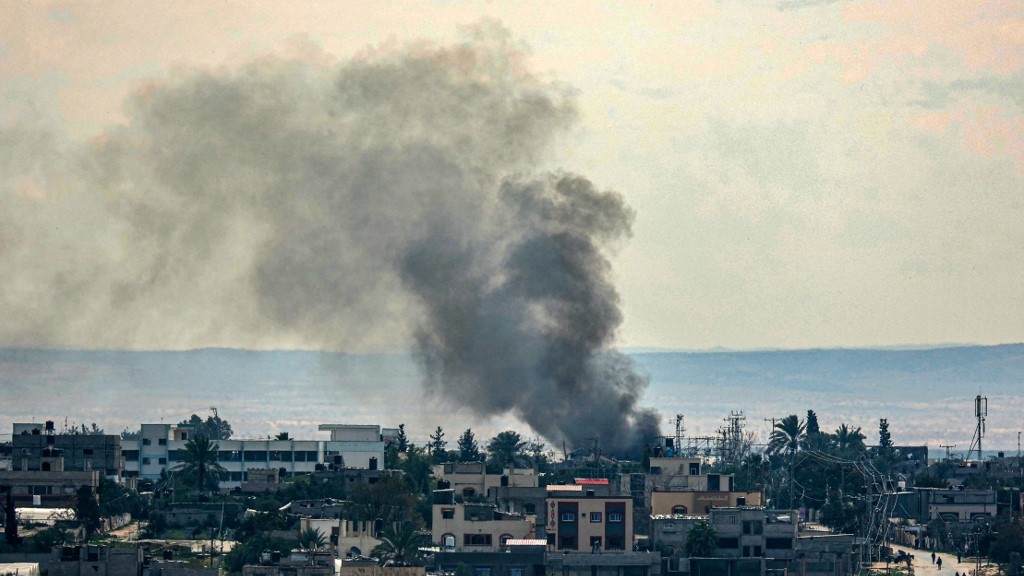War on Gaza: Netanyahu's onslaught on Rafah is further proof of his desperation

After many days of anticipation, the long-awaited Cairo talks on a Gaza ceasefire never materialised, and no deal was concluded.
The Hamas leadership refused to be bullied and pulled its delegation out of Cairo, having come to the conclusion that Netanyahu was only playing for time.
Meanwhile, the intensification of Israel’s assault on Rafah, and the promise of an imminent ground invasion in this southernmost part of Gaza, point to a deep frustration on the part of Israeli leaders.
Such indiscriminate and merciless punishment of the Palestinian civilian population has become a pattern in this war. Yet, the Hamas delegation remained for some time in Cairo, apparently keen not to be seen as the party responsible for destroying the prospects of a ceasefire deal mediated by Qatar and Egypt.
But Netanyahu’s onslaught and continuing threats meant he had no intention of doing business.
Stay informed with MEE's newsletters
Sign up to get the latest alerts, insights and analysis, starting with Turkey Unpacked
Hamas took nearly a week to respond to a previous proposal for a ceasefire and hostage exchange.
When it eventually made a counter-offer, which called for a three-stage ceasefire and exchange of Israeli and Palestinian captives, ultimately leading to an end to the war, Israel rejected the proposal.
The reason it took so long for a reply from Hamas centres on the nature of the movement’s decision-making processes. Its leadership hierarchy is supposed to represent three constituencies: Gaza, the occupied West Bank and the diaspora. Communication among these three leadership structures on highly sensitive issues can be a lengthy and complicated process.
Furthermore, the final word on a matter of this nature lies in Gaza, and not in the diaspora or elsewhere.
The people of Gaza, and their leadership, have the ultimate right to decide whether the proposed terms are acceptable. When the initial ceasefire proposal was conveyed to Hamas, it had to be communicated to the Gaza leadership and considered carefully.
Hostage exchange
Over the past four months, Israel has unleashed a massive onslaught across the Gaza Strip, killing more than 28,000 Palestinians and destroying large parts of the territory’s critical infrastructure. Ruling this to be a plausible case of genocide, the International Court of Justice (ICJ) recently laid out provisional measures aimed at stopping the killing - but Israel’s bombardment has not ceased, and the focus is now on Rafah.
On Tuesday, South Africa said it had called on the ICJ to consider whether it could use its power to prevent a further breach of the rights of Palestinians in Gaza, in light of Israel’s decision to extend its military operations in Rafah.
Follow Middle East Eye's live coverage of the Israel-Palestine war
Israel wants its hostages back. In exchange, it reportedly offered to temporarily halt the fighting and allow for the release of some Palestinian captives.
Any attempt by Netanyahu to penalise the population of Gaza for rejecting his offer will likely backfire
Amid the ongoing devastation of Gaza, the Israelis and their US and European allies perhaps thought this proposal would immediately be welcomed. But the Hamas counter-proposal suggests that the movement’s military wing is still in good shape.
It also suggests that despite all the pain and suffering, the population of Gaza does not see in the Israeli-US proposal a genuine opportunity for the resumption of a “normal” life inside the territory - but rather a brief respite before the gates of hell reopen.
Based on the experience of the past 17 years, the Gaza leadership of Hamas would not take a decision on a matter like this without first gauging the mood of the population, which is not an easy thing to do under the current circumstances.
As I seek to show in my book Hamas: Unwritten Chapters, this approach to decision-making has contributed to the movement’s continued popularity since it won the 2006 Palestinian Legislative Council elections. This is why Israel, and its collaborators within the Palestinian Authority in Ramallah, have been unable to drive a lasting wedge between Hamas and the people of Gaza.
Confident position
The counter-proposal of Hamas, which is designated as a proscribed organisation in the UK, envisions a three-stage ceasefire, with each phase lasting 45 days, enabling the gradual exchange of captives. The eventual objective would be to end the war and siege, allow relief and reconstruction, and guarantee the people’s right to return to their homes and move freely across Gaza.
Scheduling the exchange in three phases would test Israel’s commitment to implementing the deal, while ensuring that steps taken in one phase are not reversed soon afterwards. Palestinians have grown accustomed to Israel’s habit of reneging on its promises.
Israel’s refusal of the deal was wholly expected. If Israeli Prime Minister Benjamin Netanyahu is perceived to have made concessions to Hamas, his political career - already in danger - could end outright. In four months of war, he has achieved none of his publicly declared objectives, foremost among them the destruction of Hamas.
The Hamas counter-proposal suggests a confident position, which is bound to heighten Netanyahu’s anxiety and increase his desperation. Pressure is building on him from various sides, especially among the families of the hostages and their growing camp of supporters inside Israel.
Hamas will not likely settle for much less than what it offered in its counter-proposal. Any attempt by Netanyahu to penalise the population of Gaza for rejecting his offer will likely backfire. His threat to attack Rafah, where some 1.4 million people are crammed after the Israeli military machine forced them out of their homes, is simply further proof of his desperation.
The views expressed in this article belong to the author and do not necessarily reflect the editorial policy of Middle East Eye.
Middle East Eye delivers independent and unrivalled coverage and analysis of the Middle East, North Africa and beyond. To learn more about republishing this content and the associated fees, please fill out this form. More about MEE can be found here.






